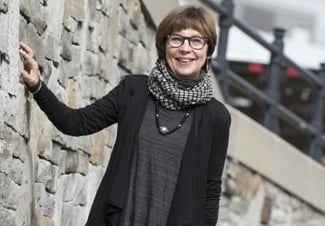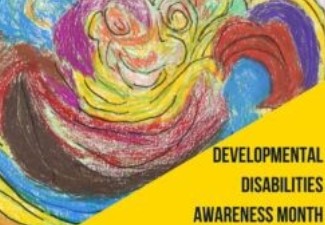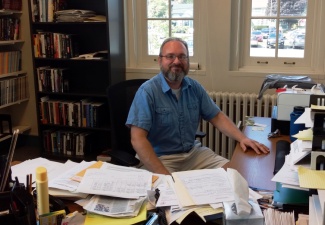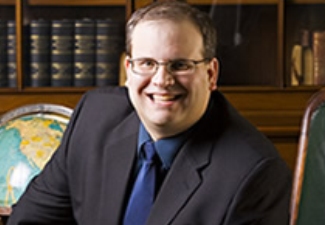Diversity Week Fosters Campus Discussions, Learning | SUNY Plattsburgh
Diversity Week at SUNY Plattsburgh served to educate students, faculty and staff about social justice, with the goal of developing a deeper understanding of others inside and outside the campus community.
Events included workshops, art and historical exhibits, a film screening and discussion, student tabling, lectures, a book display in Feinberg Library, a faculty panel discussion, and more.
“Probably the thing I hear the most from students is that it’s new information for them,” said Dr. J.W. Wiley, chief diversity officer and director of the Center for Diversity, Pluralism and Inclusion. “A lot of the things that are being introduced are things they hadn’t thought about before or heard or seen.”
He referenced a discussion following a screening of “A Normal Heart,” which portrays the New York City and federal government’s response in the 1980s to HIV/AIDS infections in gay men and the discrimination against them before there was a clear medical and social understanding of the disease.
“They didn’t know those types of things took place,” he said.
Ongoing Work
Among the week’s early events was a panel discussion featuring the college’s deans. “Diversity and Social Justice in Academics Both Now and Later” provided students, faculty, staff and community members insight into how the college is addressing student’s need for a learning environment that is more focused on diversity.
The deans shared information about their unique personal and professional backgrounds and past experiences with diversity and social justice issues. Sitting on the panel was Dr. Stephen Danna, dean of SUNY Plattsburgh’s branch campus at Queensbury; Dr. Andrew Buckser, dean of Arts and Science; Dr. Rowena Ortiz-Walters, dean of the School of Business and Economics; Holly Heller-Ross, dean of Library and Information Technology Services and Dr. Michael Morgan, dean of Education, Health and Human Services.
The unavoidable presence of hate and discrimination needs to be ever present in the minds of educators and college administrators, Morgan said.
“It’s something that needs to be struggled with,” he said, acknowledging that there isn’t any one action that can change the way students think and approach issues of diversity. “It’s ongoing work. There probably isn’t a day that goes by that I don’t think ‘What do we need to be doing?’”
Community Outreach
Ortiz-Walters said she raised the issue of a perceived lack of diversity in the Plattsburgh community during a meeting of the School of Business and Economics’ Business Advisory Council, which is made up of area business owners.
The council moved to independently fund a welcome reception and video for incoming students in the School of Business and Economics, which is ethnically diverse both in terms of faculty and students. The Business Advisory Council also expressed interest in interacting directly with students, some offering to host students in their homes for dinner.
“It was clear to me that they were engaged with this topic. They want to be allies,” Ortiz-Walters said, adding that area business owners who serve on the council want all students to feel welcome in the community and to consider living and working in the North Country after they graduate.
Diversity Week and the actions that will follow are an investment in campus culture, Buckser said, adding that exposing students to social justice issues in the classroom prepares them for future careers in an increasingly diverse world.
“Our students need that (understanding) if they’re going to be professionally successful,” he said.
Discussions Give Perspective
Senior Nicole Vicentini, a hotel, restaurant and tourism management major, said she believes the deans will take the insight they gained from the panel discussion and bring it back to their respective departments to help facilitate change and a movement toward the most inclusive, welcoming learning atmosphere possible.
“They gave a lot more (of themselves) than I was expecting,” Vicentini said. “It made me see they are willing to have these conversations with us. They actually heard us.”
Junior ecology major Rachel Penders said the discussion gave her a chance to get an inside view of the deans’ thought process and how their concern for students permeates their work.
“To discuss this was good because it gave a lot more perspective,” Penders said, referring to the work of faculty administrators.
The students agreed it was clear the deans had given much thought to how they can encourage faculty to incorporate diversity into their curriculum.
“It’s good to hear from the people we don’t talk to,” said Louis Piccirillo, a junior education major. “It was nice to see behind the scenes.”
Tunnel of Oppression
Elsewhere on campus, an interactive exhibit called “The Tunnel of Oppression” was available for viewing. It brought attendees through eight rooms, one each dedicated to heterosexism, transphobia, racism, Islamophobia, sexism, ableism and North Country awareness.
Those going through the tunnel were given a piece of paper where they could record their thoughts on each topic the display addressed through informational posters, news articles, pictures and video.
The last room was labeled “the light at the end of the tunnel.” It showed how government and social organizations are moving into the future, including details on the U.S. Supreme Court’s 2015 ruling that made gay marriage legal nationwide.
Attendees could share their personal experiences by writing them on the walls of the exhibit, incorporating students’ stories into the metaphorical tunnel.
“They were discussing how it was refreshing to see perspective on Native Americans in terms of race (discrimination) since it’s a group that’s pretty regularly left out of the conversation,” said Aaron Schwartz, a staff assistant at the Center for Diversity, Pluralism and Inclusion.
Student Participation a Key to Success
Students expressed the same sentiment to the parts of the tunnel that addressed racism toward the Asian population, he said.
Schwartz, who was taking suggestions from students about how the exhibit could be changed the next time it is open said one student suggested including a white privilege room.
“The thought process there would be that it would be a useful means for students to learn about white privilege in a way that would not take away the humanity of those who may not be as familiar with it,” Schwartz said.
As people browsed the materials posted in the room dedicated to sexism, senior Alexandria McCalla, a member of the student Organization of Women of Ethnicity spoke while a parody of the popular music video for the pop song “Blurred Lines” played on a projector screen.
McCalla told five students who had gathered how women may feel compelled to dress a certain way or wear makeup so they can live up to society’s arbitrary standard of beauty that is perpetuated by television, movies, print and social media.
Student participation in the administration of the Diversity Week events was a key to its success since it afforded students the opportunity to educate each other on topics that matter to them, McCalla said.
Students were the sole organizers of “Alpha Women, Beta Men.” The Friday event examined issues of gender pay gap and discrimination in the workplace. That event is sponsored by the National Association of Black Accountants and Alpha Phi Alpha fraternity.
‘Learning from Each Other’
Senior Jason Novak was at the Tunnel of Oppression with other members of his fraternity, Phi Mu Delta.
Novak said the since the fraternity is accepting and inclusive in its selection of members, the Phi Mu Delta brothers felt participating in Diversity Week events was important. He said the display on ableism made him feel grateful to be an able bodied person, something he doesn’t think about often.
After experiencing the exhibit, students could stop by the Amnesty Room to share their reactions, thoughts and feelings with fellow students or a staff member from the Center for Diversity, Pluralism and Inclusion.
The week’s events showcase the college’s dedication to create an increasingly inclusive, sensitive environment for all at SUNY Plattsburgh. But for the college to continue moving toward lasting change, activism must continue beyond Diversity Week, McCalla said.
“It can’t stop here.”
News
Knelly Named Special Adviser to SUNY for Clinton Transition

Quebec Studies Presents Montreal Historian in Virtual Talk on 1913 School Strike

Campus Shines Light on Developmental Disabilities During Awareness Month and Beyond
Black Solidarity Day Officially Added to SUNY Plattsburgh’s Academic Calendar

SUNY Plattsburgh Political Science Professor to Zoom a Discussion on the Russian Invasion of Ukraine
